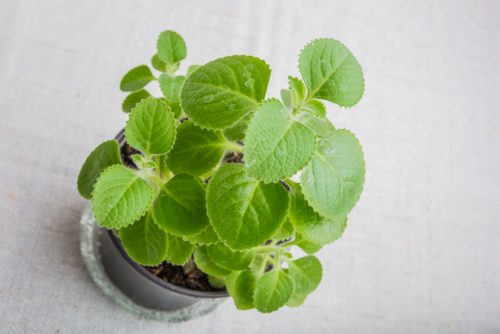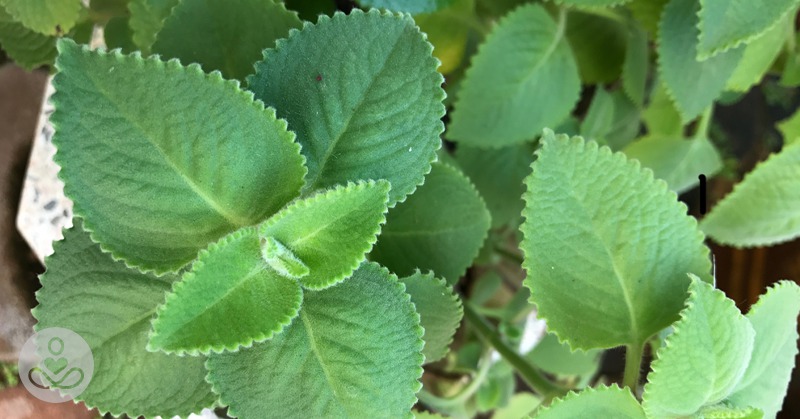If you love to cook but are tired of using the same old herbs for every recipe, you’ll be happy to learn that oregano (your old favorite) has a cousin called Cuban oregano that is taking taste buds by storm. Not only will the taste cause your jaw to drop, but you’ll be wowed by the incredible health benefits that it brings to the table.
What is Cuban oregano?

Not to be mistaken for common oregano, thyme, or borage, this herb brings a set of health benefits of its own and is used for therapeutic and medicinal purposes as well as culinary preparations.
Also known as Coleus Aromaticus, Cuban oregano is known for its pungent, musky aroma, with a flavor profile that’s similar to oregano with a hint of thyme. It is a herb that is available year-round and is easy to grow in your own garden.
Cuban oregano contains many beneficial compounds and is rich in carvacrol, thymol, eugenol, chavicol, ethyl salicylate. It contains carvacrol and thymol (found in both common oregano and thyme) which are responsible for the flavor[1]. Cuban oregano has similar healing properties to common oregano and thyme due to the fact that some of the properties are the same. So, if you’re an oregano and thyme fan then you will love the Cuban variety.
Cuban Oregano Uses
There have been many promising studies conducted on Cuban oregano to see what exactly is present within the herb that acts as such a powerful healer. Through these studies we know that this herb can assist in soothing rheumatoid arthritis symptoms, reducing anxiety, healing wounds, and, like common oregano, it has antimicrobial properties as well.
Soothes Inflammation from Rheumatoid Arthritis
In Taiwan, Cuban oregano is used to treat inflammatory diseases and swelling symptoms[1]. Studies have been done on animal subjects to determine the effectiveness of the herb to treat rheumatoid arthritis. These studies found that Cuba oregano significantly reduces footpad swelling and arthritis symptoms in rats[2], showing that it may perhaps be a successful treatment method for individuals suffering from arthritis symptoms.
May Help Fights Anxiety
Studies have shown that Cuban oregano helps to reduce anxiety in test rats. When the rats underwent a series of anxiety-inducing tests, the rats that had ingested Cuban oregano completed the tasks with less anxiety than the rats that had not[3]. This evidence leads researchers to believe that Cuban oregano may have properties that assist in the relief of stress.
May Have Potential to Heals Wounds
A potential wound-healing property has been found in Cuban oregano when a herbal suspension was made from pomegranate and Cuban oregano to heal the wounds of Albino rats[4], showing that it may be possible to use Cuban oregano to heal wounds in humans.
May Help With Respiratory Symptoms
The juice of Cuban oregano leaves mixed with honey is helpful in relieving coughs and cold symptoms. While warm, this concoction is effective in soothing respiratory infections[1].
Antifungal and Antimicrobial Properties
Cuban oregano oil has been tested and proved to be effective against various fungi because it inhibits the growth of mycelia. [1]
Although many tests have been conducted on this herb, and many promising results have been found, there still need to be more human trials run in order to deduce the true healing benefit of Cuban oregano.
Cuban Oregano Recipes

The strong flavor and aroma of these leaves make them ideal for flavoring meats and fish. In India, Cuban oregano leaves are added to coconut, dhal, red chilies, coriander leaves and curry leaves in order to make a delicious chutney. It can also be eaten raw with bread and butter, used as a fried snack, and used for flavoring beer and wine. [1]
One of the advantages of this healthy herb is that you can grow it in your garden and incorporate it into your cooking whenever you please!
If you’re interested in learning how to grow this herb in your garden, watch this short video:
Due to the fact that more studies need to be conducted on humans to fully see the health benefits that Cuban oregano has, I wouldn’t solely rely on it to heal all of your ailments. That being said, there is some promising evidence to suggest that this herb may be able to increase your quality of life. If nothing else, adding this new herb to your diet will change things up in your routine and give your cooking a little bit of extra spice, which is never a bad thing.
Sources
- [1] Dadasaheb D. Wadikar, Prakash E. Patki. Coleus aromaticus: a therapeutic herb with multiple potentials. (July 2016).
- [2] Jia-Ming Chang, Chun-Ming Cheng, Le-Mei Hung, Yuh-Shan Chung, and Rey-Yuh Wu. Potential Use of Plectranthus amboinicus in the Treatment of Rheumatoid Arthritis. (2007).
- [3] DILIP KUMAR TIWARI, HEMANT NAGAR, GAURAV DWIVEDI, RISHI KANT TRIPATHI, JITENDRA JENA. EVALUATION OF ANTI-ANXIETY ACTIVITY OF PLECTRANTHUS AMBOINICUS (LOUR.) ON RATS. (Feb. 7, 2012). https://innovareacademics.in/journal/ajpcr/Vol5Suppl4/1376.pdf
- [4] Soni H, Nayak G, Patel SS, Mishra K, Singhai AK, Swarnkar P, Pathak AK. Synergistic effect of polyherbal suspension of Punica granatum and Coleus aromaticus in evaluation of wound healing activity. J Herbal Med Toxicol. 2011;5(1):111–115.
Disclaimer: This information is not intended to be a substitute for professional medical advice, diagnosis or treatment and is for information only. Always seek the advice of your physician or another qualified health provider with any questions about your medical condition and/or current medication. Do not disregard professional medical advice or delay seeking advice or treatment because of something you have read here.

